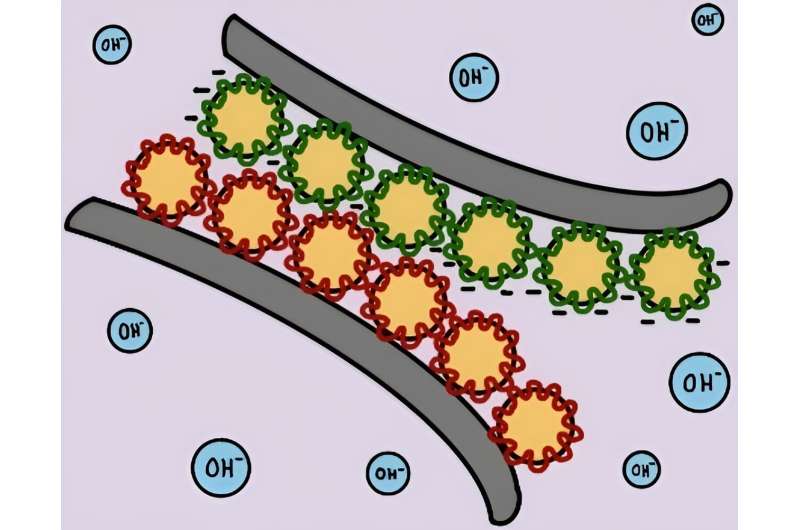This article has been reviewed according to Science X's editorial process and policies. Editors have highlighted the following attributes while ensuring the content's credibility:
fact-checked
peer-reviewed publication
trusted source
proofread
Researchers develop water-based adhesive that can be recycled by changing pH

A research team has developed a reversible, water-based glue that has good adhesion in the neutral pH range, but can be detached again in strongly acidic or alkaline environments. As the team writes in the journal Angewandte Chemie International Edition, the novel adhesive system, which is based on electrostatic interactions, has bond strengths somewhere between those of structural adhesives and pressure-sensitive adhesives. The new adhesive also bonds "difficult" surfaces such as water-repellent polypropylene.
Structural adhesive systems, such as two-component adhesives, form chemical bonds when they react and cannot be separated again along the adhesive interface. Pressure-sensitive adhesives such as Scotch tape, on the other hand, can be cleanly removed by pulling. Adriana Sierra Romero, Katarina Novakovic, and Mark Geoghegan of Newcastle University in the U.K. have now found an alternative route to achieving adhesion and separation: charge interactions promote structural bonding along the interface, which can be neutralized and thus dissolved again.
To obtain the charge interaction, the team developed two separate water-based polymer dispersions to be applied to surfaces. In both dispersions, the base polymer was a copolymer composed of the inexpensive, commercially available components styrene and butyl acrylate.
For one dispersion, the researchers coated the particles with the surfactant lauryl sulfate and polymerized acrylic acid, which together provide a negative charge in the neutral to alkaline pH range. For the other dispersion, they coated the particles with the polysaccharide chitosan, which contains positively charged amino groups in neutral or acidic environment.
Both polymer dispersions formed sticky coatings on a variety of surfaces. The researchers then observed that, when brought into contact, the coated surfaces stuck tightly together due to the electrostatic interactions between the positive and negative charges within the films.
This was even true in humid or wet environments, which usually have a detrimental effect on water-based adhesives. However, when the pH was adjusted to one extreme or the other, by adding either a strong acid or base, the negative or positive charges within the glue were neutralized, and the adhesion disappeared.
The team say that the pH-sensitive adhesive system could serve as a novel, and recyclable, middle ground between structural adhesives with fixed chemical bonds and peel-off adhesive films that bond using physical interactions. They also emphasize that their novel electrostatic glue adheres well to highly water-repellent polypropylene surfaces, which are otherwise difficult to treat with aqueous adhesive systems.
Finally, the team propose integrating a bio-based material from soybean oil into the base polymer, taking a further step toward environmentally friendly, recyclable bonding systems.
More information: Adriana Sierra‐Romero et al, A reversible water‐based electrostatic adhesive, Angewandte Chemie International Edition (2023). DOI: 10.1002/anie.202310750
Journal information: Angewandte Chemie International Edition
Provided by Wiley





















